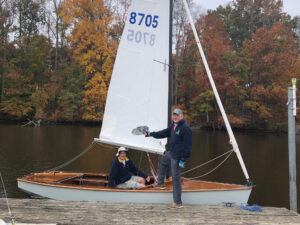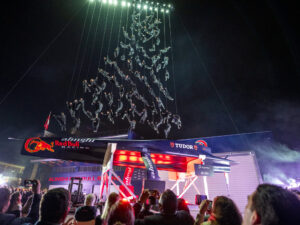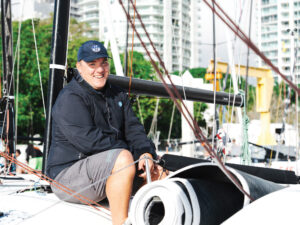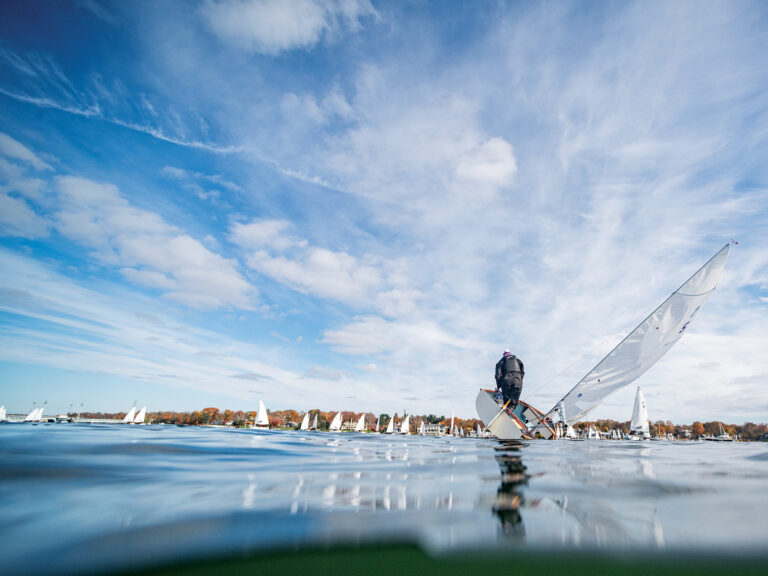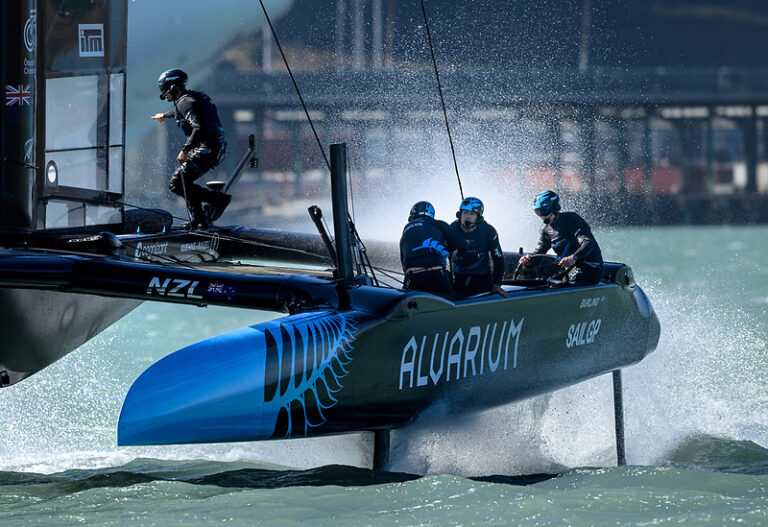ANY COLLEGE SKIPPER WHO THINKS THAT the crew is there just to deal with the sheet wont win too many races. If a skipper and crew dont work well together, the boat is almost always slow. To learn the ins and outs of the front half of the boat, we sat down with two of the best crews in college sailing. Jessica Amen of Petaluma, Calif., is a junior at USC majoring in Vocal Jazz and minoring in Music Industry. She sailed extensively in high school and was recruited to sail at USC. Susan Bonney of Westford, Mass., is a junior at Harvard majoring in Classics. Her only sailing experience before college consisted of summer cruises with her grandparents. Both Amen and Bonney were 1999-2000 ICSA All-America selections.
What’s the difference between a good crew and a great crew?
Amen: The main difference is whether they can easily switch between skippers. They have to be versatile, easy to get along with, and happy to sail with whomever their coach assigns.
Bonney: A good crew can tough out the hiking and sails by following the skipper’s directions. A great crew loves all conditions and knows what they need to do without a word from his or her skipper. I’m still working on that.
When you first started crewing, what gave you the most trouble?
Amen: Putting all the pieces together. Sailing is such a complex sport and thinking about wind shifts, rules, current, and tactics all at once is something learned over time. In the last couple of years it’s been coming together. A lot of practice has been the key.
Bonney: I had no idea what was going on. Sometimes, I still feel like I don’t. What was worse was that once I figured out some of the basics of boathandling, I had to come to grips with the fact that there was a whole course out there. One of the toughest things to learn was how to transition in different conditions. It’s still something I’m working on. You must pay attention to each tack, jibe, and rounding, and adjust accordingly.
What’s the best thing about crewing?
Amen: The best thing about being a crew is that you know how important your position is on the boat and that your skipper can’t possibly sail without you. You also don’t have to stay late in your stinky sailing clothes for a protest.
Bonney: Being part of a great team, but also realizing how important you are to that team, is an incredible feeling-the best thing about being a crew. I love sailing with someone of similar size; it allows me to be more involved in what’s physically happening to the boat.
The worst?
Amen: You have to deal with whatever the skipper dishes out and try not to take it personally. When I first started crewing for my high school team, I took every comment personally, and it often affected my performance. You have to blow that stuff off because it’s not about you.
Bonney: Sometimes it’s really easy to forget that you’re part of a team. It’s easy to feel less responsible when you’re winning, but more so when you’re losing. I know it’s a mentality a lot of crews share, and it’s really important to shake that feeling because it’s just ridiculous. The boat is a “we,” not an “I.”
Is there anything that a skipper does that really drives you crazy?
Amen: Yeah, I’ve snapped back at my skipper. Sometimes, if my skipper is completely out of line, I drop the jib sheet and say, “You try and sail the boat without me!” But the worst thing is when my skipper gets an award and doesn’t thank his crew at the awards ceremony. That drives me crazy; the rest I can deal with!
Bonney: Occasionally, a skipper’s fixation with a tiny amount of inconsequential water in the boat can be annoying, but it’s understandable. I’ve also noticed that as I’ve gained confidence in crewing, I get a little bit defensive and indignant when commanded to do something. My regular skipper doesn’t do this, and I only react to people I know well, but I’ve definitely snapped at one person I can think of-all in good fun, of course.
What advice do you have for any new crews?
Amen: Keep your eyes open and give your skipper every piece of info possible, even if it seems silly or obvious. A lot of the time the skipper is so concentrated on something that he or she may not notice that boat on starboard.
Bonney: Love the feel of sailing. Unless you really love the spray, the waves, and the feel, it’s not so easy to keep your enthusiasm after hours of being wet and cold. Enjoy the challenge of sailing with people of different sizes, abilities, and techniques-the more you do, the more you learn.
Describe your training, both in and out of season?
Amen: I train pretty much all year. My regular workout consists of five days of cardio a week, one day of yoga and stretching, and four days of weight training with abs every other day. On the water, I like doing tacking and jibing drills, practice starts, stop/start drills, and team racing. I always like playing sailing Frisbee tag.
Bonney: During practice, we make sure to identify and work out any kinks in our boathandling and communication. Rudderless sailing has helped me with weight placement. We commit at least three days a week to hard sailing. As commodore I organize special events to make sure the team gets along outside of practice. I’ve pretty much turned my life over to the team, but I think it’s a fabulous way to experience college sailing.
Anything you would do differently if you had the chance?
Bonney: If I could start from scratch, I’d demand that I be taught to drive right away. Until this past summer, I had shied away from learning how, and I really wish I would’ve been more comfortable with being a bad skipper earlier. It’s made a world of a difference in my mentality and gratefulness for every time that I can get back in the front of a boat.

